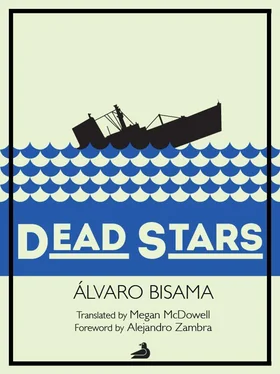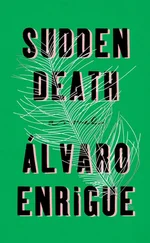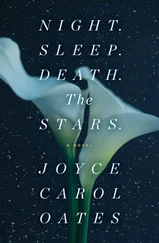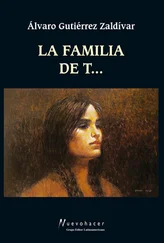Before she opened the newspaper, before the photo, before her story, she told me about the ending of a teen movie, where this character explodes and turns into a cockroach and then escapes through the bedroom window. She said the window was only a prop, there was nothing outside it: someone had painted a trompe l'oeil of stars in the night sky. The cockroach went running out there, headed for that false sky. In the room, someone was left screaming in a bed full of blood. Then there was a song with the line "Love is stronger than death." She said she'd become obsessed with that song. We talked about that while we killed time, waiting. About nothing important. We could do that for hours: talk about the meanderings of a song that wouldn't let itself be forgotten, fluorescent stars twinkling in a papier mâché sky, people covered in fake blood, lovers who turn into cockroaches. It worked, and we would lose ourselves in the inferno of details to avoid walking in the desert of the real. But it was precarious: a calm that lasted until she took a sip of hot coffee, opened and almost immediately closed The Valparaíso Star , and then started to cry. After a few minutes she calmed down. She didn't cry again, not even when — some time later — she finished telling me everything. First, she swallowed her tears and showed me the photo. She said, pointing at the page with her finger, pointing at the woman: I know her.
I know that girl, man. That's Javiera, she said. It's Javiera, she was a classmate of mine at the university. Javiera, she said, the one I told you about, the communist. Javiera from the Youth League. I nodded. I pretended to understand. I knew part of the story, details she had told me with no clear connection, details that were nothing but shards and loose ends of other people's lives that she finally made sense of that morning: the article and the photo were a kind of gate that she could open or close, but either way she would catch glimpses of her own past, a past I barely knew about because it had been buried someplace in a port city where the sky had yet to turn black and there was no ashy wind to breathe in, a decade and a half before.
She said: You're going to have to listen to me, you owe it to me; we're going to spend the whole morning on this shit.
It starts just like that: with an image. The two of them sitting together. In the first row. By chance. I stayed in the back. It was the first day of classes. I didn't talk to anyone. They talked to each other. Maybe that's what defined everything. The first minute of the years to come, the laws of attraction that would embrace them, the solitude of the rooms they would inhabit and the desert they would flee to, the volume of the gray sea's murmur, like a dream of silence. I don't remember what class it was. I don't have such a good memory. I don't even remember what our majors were. I don't know if majors are important here, or jobs — any of the things that define us in the eyes of others. What matters is the beginning, which I can't help but fill in with lies or assumptions as I tell you about it, as I wonder whether that was the decisive day, if it was then that they began this thing that is only now ending. Because I can't see any of that, she said. The past is a place the light doesn't reach, she said. I don't know if they looked at each other, if they recognized the probability of some connection, she said. Then the professor made us introduce ourselves. I remember I said my name and that I lived in Viña. That was all I could say about myself. It was the only thing I was certain of. I remember that Donoso said: I'm from Antofagasta. I remember that Javiera said: I lived in exile and I came back last year. I remember that Donoso was dark-skinned and looked almost hairless. Later I would learn he was eighteen years old. I remember I had read that year, on a beach close to Quintero, a novel by Agatha Christie. It was also the year after the president who smiled like an idiot ended up crying on TV. I remember that Donoso wore a white school shirt, and Javiera was dark and had a few white hairs and wore glasses and was short and very thin and that she wore lilac-colored clothes, faded hand-dyed blouses. I can't remember how I wore my hair that day.
I didn't know you remembered so many details, I said. I didn't either, she said.
She said: It all comes back at once, it all comes back so suddenly. The photo opens the door. My memory is the room. I have a head full of furniture. They're wandering around in there now. They — Javiera and Donoso — are a multitude, and I can hardly contain them. But I'd rather that than go on crying; although maybe that's exactly what I should do, man: cry until I learn to accept it all. I can't. Maybe you think I'm crazy, she said. I looked at her and bit my bottom lip. The spit burned my mouth. I took a breath. I ordered two more coffees. I looked at the photo in the paper again: a woman with white hair, a woman getting into a patrol car. No, I said.
But it doesnt look like her. The woman in the photo doesn't look like her. It's her, but it isn't. In the photo she looks old. The photo doesn't do her justice. That downcast, lost look — it's not hers. Javiera used to talk so loudly that sometimes you'd think she was shouting. The next day we heard half her life in five minutes, when she asked us to stay after class to choose a student representative. Of course, we immediately elected her. That day, she told us she'd been expelled in the eighties. She told us how the rector had called for her head and she was kicked out of school. She left the country. The rest of us had all been just kids back then. None of our life stories could compete with hers. What could I talk about? My story was the same as everyone else's. I'd gone to a public high school, I had a boyfriend I cared about, I secretly listened to Iron Maiden, I read mystery novels or watched TV until I fell asleep. That was it: a handful of things that had nothing to do with each other, that lacked any kind of story. When that class was over, they left the room together. I walked behind them. I don't know what I thought of Javiera that day. I don't know if I liked her or not, if I believed her or not. I remember that someone had hung an MIR poster of Miguel Enríquez's face in the hallway. I didn't know who he was, or that he was dead. Enríquez's face was in black and white, in profile: suspended in action, weightless, frozen like a saint, the deceased man's portrait on top of a coffin, a distant relative who only appears in a photo from another era. Javiera stood there looking at it. For a second I thought they might know each other. She said something out loud, but I don't remember what. I don't think any of it mattered much to me until a week later, when she invited me to a Youth League meeting.
I went to the meeting. I listened to the way she spoke. I don't remember what she said, but I noticed her fervor. I noticed how Javiera embraced and enveloped the others, the way she looked everyone in the eye and waited for an answer. I realized she had been pretty. That once she had been beautiful. Girls pick up on these things. We pick up on beauty and its desertion; beauty had been there, but now there were only her facial features: her small black eyes, her hair falling over her face in a certain way, her mouth's way of breaking open into a smile. A losing battle, beauty. We women can see that, but we try not to because it's like looking at ourselves in a mirror, she said. Like looking at ourselves in a pool and seeing an image from the future in the water, she said. And Javiera provoked that feeling. Or at least she provoked it in me when I was eighteen: déjà vu, a warning about the person I could become. But it was only that, a warning, an illusion, because I knew I could never speak like her, I would never talk about or hold on to things with her conviction. I would never have that capacity for immediate empathy, that certainty of being able to achieve some kind of connection with another person. But I was aware of her broken beauty, yes. I was aware of it and I forgot about it almost immediately.
Читать дальше





![Джеймс Чейз - Safer Dead [= Dead Ringer]](/books/430347/dzhejms-chejz-safer-dead-dead-ringer-thumb.webp)






